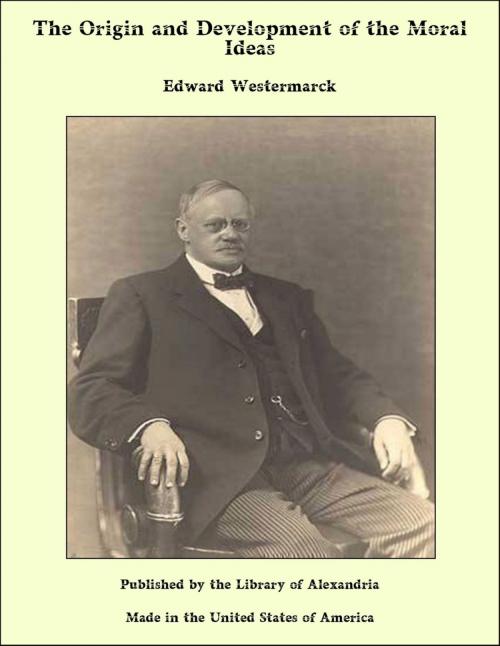The Origin and Development of the Moral Ideas
Nonfiction, Religion & Spirituality, New Age, History, Fiction & Literature| Author: | Edward Westermarck | ISBN: | 9781465616227 |
| Publisher: | Library of Alexandria | Publication: | March 8, 2015 |
| Imprint: | Language: | English |
| Author: | Edward Westermarck |
| ISBN: | 9781465616227 |
| Publisher: | Library of Alexandria |
| Publication: | March 8, 2015 |
| Imprint: | |
| Language: | English |
THAT the moral concepts are ultimately based on emotions either of indignation or approval, is a fact which a certain school of thinkers have in vain attempted to deny. The terms which embody these concepts must originally have been used—indeed they still constantly are so used—as direct expressions of such emotions with reference to the phenomena which evoked them. Men pronounced certain acts to be good or bad on account of the emotions those acts aroused in their minds, just as they called sunshine warm and ice cold on account of certain sensations which they experienced, and as they named a thing pleasant or painful because they felt pleasure or pain. But to attribute a quality to a thing is never the same as merely to state the existence of a particular sensation or feeling in the mind which perceives it. Such an attribution must mean that the thing, under certain circumstances, makes a certain impression on the mind. By calling an object warm or pleasant, a person asserts that it is apt to produce in him a sensation of heat or a feeling of pleasure. Similarly, to name an act good or bad, ultimately implies that it is apt to give rise to an emotion of approval or disapproval in him who pronounces the judgment. Whilst not affirming the actual existence of any specific emotion in the mind of the person judging or of anybody else, the predicate of a moral judgment attributes to the subject a tendency to arouse an emotion. The moral concepts, then, are essentially generalisations of tendencies in certain phenomena to call forth moral emotions. However, as is frequently the case with general terms, these concepts are mentioned without any distinct idea of their contents. The relation in which many of them stand to the moral emotions is complicated; the use of them is often vague; and ethical theorisers, instead of subjecting them to a careful analysis, have done their best to increase the confusion by adapting the meaning of the terms to fit their theories. Very commonly, in the definition of the goodness or badness of acts, reference is made, not to their tendencies to evoke emotions of approval or indignation, but to the causes of these tendencies, that is, to those qualities in the acts which call forth moral emotions. Thus, because good acts generally produce pleasure and bad acts pain, goodness and badness have been identified with the tendencies of acts to produce pleasure or pain. The following statement of Sir James Stephen is a clearly expressed instance of this confusion, so common among utilitarians:—“Speaking generally, the acts which are called right do promote, or are supposed to promote general happiness, and the acts which are called wrong do diminish, or are supposed to diminish it. I say, therefore, that this is what the words ‘right’ and ‘wrong’ mean, just as the words ‘up’ and ‘down’ mean that which points from or towards the earth’s centre of gravity, though they are used by millions who have not the least notion of the fact that such is their meaning, and though they were used for centuries and millenniums before any one was or even could be aware of it.”
THAT the moral concepts are ultimately based on emotions either of indignation or approval, is a fact which a certain school of thinkers have in vain attempted to deny. The terms which embody these concepts must originally have been used—indeed they still constantly are so used—as direct expressions of such emotions with reference to the phenomena which evoked them. Men pronounced certain acts to be good or bad on account of the emotions those acts aroused in their minds, just as they called sunshine warm and ice cold on account of certain sensations which they experienced, and as they named a thing pleasant or painful because they felt pleasure or pain. But to attribute a quality to a thing is never the same as merely to state the existence of a particular sensation or feeling in the mind which perceives it. Such an attribution must mean that the thing, under certain circumstances, makes a certain impression on the mind. By calling an object warm or pleasant, a person asserts that it is apt to produce in him a sensation of heat or a feeling of pleasure. Similarly, to name an act good or bad, ultimately implies that it is apt to give rise to an emotion of approval or disapproval in him who pronounces the judgment. Whilst not affirming the actual existence of any specific emotion in the mind of the person judging or of anybody else, the predicate of a moral judgment attributes to the subject a tendency to arouse an emotion. The moral concepts, then, are essentially generalisations of tendencies in certain phenomena to call forth moral emotions. However, as is frequently the case with general terms, these concepts are mentioned without any distinct idea of their contents. The relation in which many of them stand to the moral emotions is complicated; the use of them is often vague; and ethical theorisers, instead of subjecting them to a careful analysis, have done their best to increase the confusion by adapting the meaning of the terms to fit their theories. Very commonly, in the definition of the goodness or badness of acts, reference is made, not to their tendencies to evoke emotions of approval or indignation, but to the causes of these tendencies, that is, to those qualities in the acts which call forth moral emotions. Thus, because good acts generally produce pleasure and bad acts pain, goodness and badness have been identified with the tendencies of acts to produce pleasure or pain. The following statement of Sir James Stephen is a clearly expressed instance of this confusion, so common among utilitarians:—“Speaking generally, the acts which are called right do promote, or are supposed to promote general happiness, and the acts which are called wrong do diminish, or are supposed to diminish it. I say, therefore, that this is what the words ‘right’ and ‘wrong’ mean, just as the words ‘up’ and ‘down’ mean that which points from or towards the earth’s centre of gravity, though they are used by millions who have not the least notion of the fact that such is their meaning, and though they were used for centuries and millenniums before any one was or even could be aware of it.”















